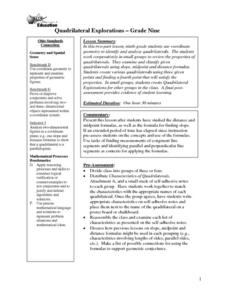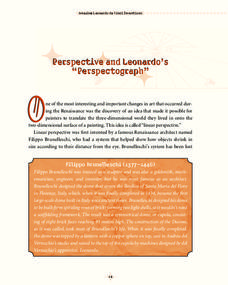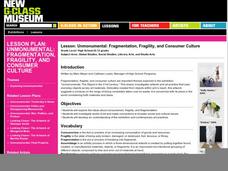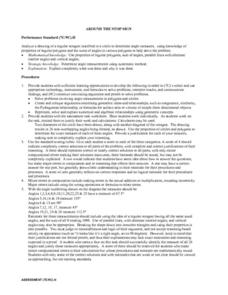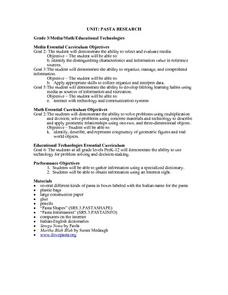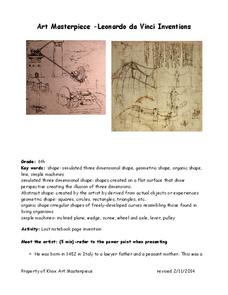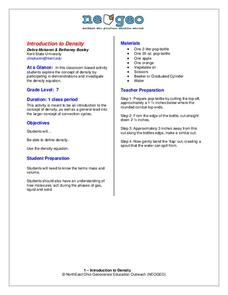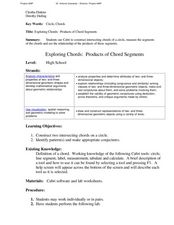Curated OER
Symmetry
Learners explore symmetry. In this geometry lesson, student identify and define bilateral symmetry, radial symmetry, pentagonal symmetry, hexagonal symmetry, and cubic symmetry. Students construct examples of these types of symmetry and...
Cornell University
Constructing and Visualizing Topographic Profiles
Militaries throughout history have used topography information to plan strategies, yet many pupils today don't understand it. Scholars use Legos and a contour gauge to understand how to construct and visualize topographic profiles. This...
Ohio Department of Education
I Can Name that Angle in One Measure! - Grade Eight
Collaborative groups work with geometry manipulatives to investigate conjectures about angles. They create a graphic organizer to use in summarizing relationships among angles in intersecting, perpendicular and parallel lines cut by a...
NTTI
Transform Your Geometry into a Work of Art
Mathematicians utilize artwork to help illustrate the major ideas of transformations and tessellations. They visually identify transformations including reflections, rotations, and translations. They discuss how artists have used...
Curated OER
Quadrilateral Explorations
Ninth graders identify quadrilaterals and label the vertices of quadrilaterals. they justify their identification of the quadrilaterals. Students work in groups to identify and create quadrilaterals
Curated OER
"The Wind" by James Reeves
Inntroduce primary learners to essential critical reading strategies with an activity based on James Reeves' poem, "The Wind." Learners listen as the poem is read, first as a riddle, and then re-read with the title visible. The...
Curated OER
The Sum of Our Integer Intelligences
Learners complete tasks. In this Seven Intelligences lesson, students complete a variety of activities that are all based on the seven different intelligences humans are supposed to possess based on Dr. Gardener's theory. They work in...
The New York Times
Perspective and Leonardo’s “Perspectograph”
Filippo Brunelleschi's invention of linear perspective during the Renaissance was further developed by his apprentice, a young artist named Leonardo da Vinci. Now modern artists can give da Vinci's famous perspectograph a try...
Curated OER
Lesson: Unmonumental: Fragmentation, Fragility, and Consumer Culture
Looking at art is the first step to analyzing it. And, if you can analyze art, you can analyze anything. Kids examine several pop art pieces that represent consumerism in modern culture. They discuss multiple facets of each piece and...
Curated OER
Around The Stop Sign
Students analyze a drawing of a regular octagon inscribed in a circle to determine angle measures, using knowledge of properties of regular polygons and the sums of angles in various polygons to help solve the problem. They use...
Curated OER
Whose Afraid of Contemporary Art?
Have your class create original modern art sculptures. Learners analyze and discuss "The Profile," a sculpture by Martin Puryear. They work in teams to develop a proposal for a large outdoor sculpture in the community. Presentations...
Curated OER
Relief Drawing
High schoolers choose an interesting view for an art relief project. They outline their composition, and shade their relief using charcoal pencil. The results are fabulous! One nice thing about this art project is that the materials...
Curated OER
Pottery with Artist Kerry Moosman
After watching a video of Native American artist Maria Martinez create art out of clay, learners will create burnished coil pots similar to those made by artist, Kerry Moosman. This lesson includes a supply list, web links, historical...
National Gallery of Canada
Artful Emotions
Blue is sad, and red is angry, but why is that? Young artists explore the expression of emotions through art by observing and creating artwork. Starting with a questioning session about images of art, this plan moves into a sculpture...
Dick Blick Art Materials
Natural Twig Journals
Connect science, art, and language arts with a nature-themed bookmaking project. Kids craft book covers, cut paper for pages, and learn how to bind their creations.
Curated OER
Pasta Research
Third graders read the story STREGA NONA together as a class and discuss what they know about pasta. They each receive pieces of pasta to glue down on construction paper and write beneath each one what they think it looks like.
Curated OER
Sculptures from the Skies
Fourth graders research the design of the aircraft used by the Wright Brothers at Kitty Hawk. They design a sculpture of aircraft using recycled materials.
Curated OER
Line: a Geometric Exercise
Students study the different types of lines and create a drawing demonstrating what they learned.
Chandler Unified School District
Art Masterpiece—Leonardo da Vinci Inventions
After getting to know the inventor, Leonardo da Vinci and his many inventions, scholars think up their own invention. Following a written description and a hand-drawn picture, learners use a method of mirror writing and antiquing to give...
NorthEast Ohio Geoscience Education Outreach
Introduction to Density
Seventh grade scientists weigh in on the concept of density. In a nutshell, they participate in the following activities:
Measurement of the mass and volume of fruit in order to compare densities
Measurement of the mass of oil and water...
Curated OER
Circle, Secants
Students identify the secant segment of a circle. In this geometry lesson, students investigate secant lines formed outside the circle. They use Cabri software to create drawings and explore circles and secants.
Curated OER
Exploring Chords: Products of Chord Segments
Students identify the properties of chords. In this geometry lesson, students multiply chord segments to find the solution to their problem. They construct two chords that cross on a circles.
Curated OER
Product of Chord Segments
Students creating chords intersection using circles. In this geometry lesson, students create visuals of chords ad their properties using Cabri technology. They measure the chords and explore the relationship among chords.
Curated OER
Surface Area of Prisms
Learners calculate the surface area of different prisms. In this geometry lesson, students identify the shapes of solids based on the properties of that solid. They calculate the surface area using nets and properties of prisms.




